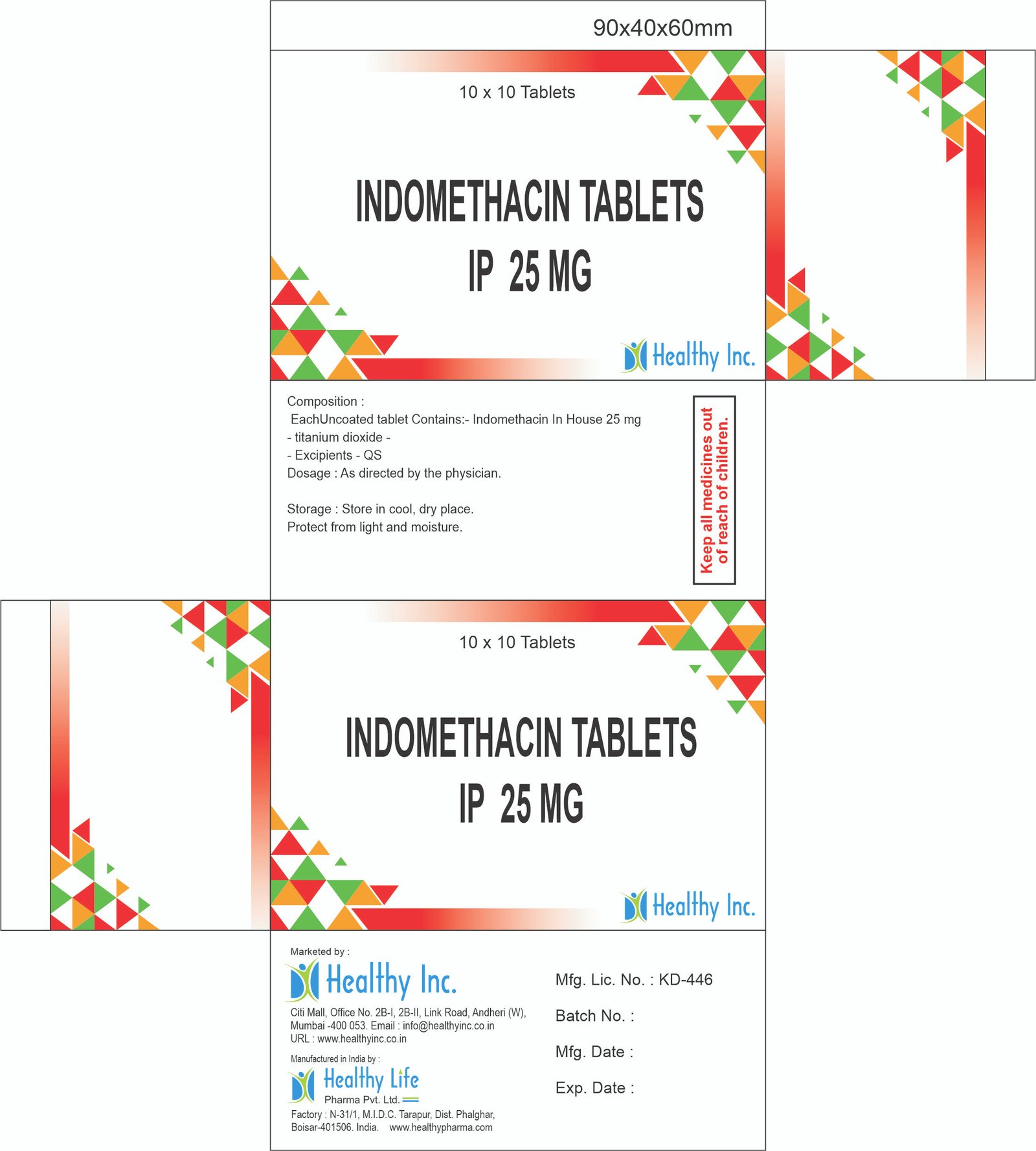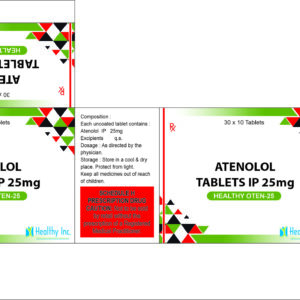Description
Indomethacin Tablets (25mg / 50mg / 75mg SR)
Manufactured by: Healthy Life Pharma Pvt. Ltd. (WHO-GMP Certified)
Exported by: Healthy Inc (Star Export House)
1. Product Introduction
Healthy Life Pharma Pvt. Ltd. is a specialized Manufacturer of Indomethacin Tablets in India. Indomethacin is a potent Non-Steroidal Anti-Inflammatory Drug (NSAID) known for its strong anti-inflammatory and analgesic effects. It is often considered a “heavy-duty” NSAID, reserved for acute conditions like Gouty Arthritis, Ankylosing Spondylitis, and severe Osteoarthritis where other NSAIDs have failed.
We offer Contract Manufacturing (Third Party) services for this high-potency drug. Indomethacin is notorious for causing gastric irritation. Our WHO-GMP certified facility in Mumbai utilizes advanced Enteric Coating Technology to ensure the tablet passes through the stomach intact and releases the drug only in the intestines. This significantly reduces the risk of stomach ulcers and nausea, improving patient tolerance. Healthy Inc manages the export logistics, supplying rheumatology clinics and pharmacy chains across the USA, Europe, and Southeast Asia.
2. Product Specifications
| Parameter | Specification |
| Product Name | Indomethacin Tablets (Enteric Coated / Sustained Release) |
| Generic Name | Indomethacin Tablets USP / BP / IP |
| CAS Number | 53-86-1 |
| Strength | 25mg / 50mg / 75mg (SR) |
| Dosage Form | Enteric Coated Tablet (Green/White) / SR Tablet |
| Standard | USP / BP / IP Compliant |
| Therapeutic Class | NSAID (Acetic Acid Derivative) |
| Shelf Life | 36 Months |
| Packaging | 10×10 Blister / 100s, 500s Bottle |
3. Manufacturing Technology
Protecting the stomach from a potent drug.
The Manufacturer: Healthy Life Pharma Pvt. Ltd.
Enteric Coating: Indomethacin is highly acidic and irritating to the gastric mucosa. We apply a specialized Phthalate-Free Enteric Polymer coating that resists stomach acid (pH 1.2) and dissolves only in the higher pH of the small intestine (pH 6.8). This protects the stomach lining from direct injury.
Sustained Release (SR) Matrix: For the 75mg strength, we use a hydrophilic matrix system to release the drug slowly over 12-24 hours. This reduces the “peak” blood levels that often cause the frontal headache associated with Indomethacin.
Stability: The drug is sensitive to light. We process it in amber-lit zones and use opaque packaging to prevent degradation.
The Exporter: Healthy Inc
Child-Resistant Packaging: Given its potency and toxicity in overdose, we offer child-resistant blister foils or bottle caps for regulated markets.
4. Quality Assurance
We adhere to strict Pharmacopoeial standards:
Dissolution (Enteric): We test in two stages: 2 hours in Acid Stage (0% release) followed by Buffer Stage (>80% release) to prove gastric resistance.
Assay: We confirm the potency is strictly within 90-110% of the label claim.
Impurity Profiling: We strictly monitor for degradation products (4-chlorobenzoic acid) to ensure safety.
5. Why Use Indomethacin?
When inflammation needs to be stopped fast.
Mechanism: It is a potent, non-selective inhibitor of COX-1 and COX-2 enzymes. It is particularly effective at inhibiting neutrophil motility, which makes it uniquely powerful for treating Acute Gout attacks where neutrophils are attacking uric acid crystals.
Key Indications:
Acute Gouty Arthritis: Rapid relief of the intense pain and swelling of a gout flare.
Ankylosing Spondylitis: Reduces morning stiffness and back pain in this spinal arthritis.
Cluster Headaches: Specifically effective for certain types of chronic headaches (Hemicrania continua).
Bursitis/Tendonitis: Severe inflammation of the shoulder (acute subacromial bursitis).
6. Export and Regulatory Support
We streamline the registration process for our B2B partners:
Dossier Support: We offer CTD and ACTD Dossiers for quick registration.
Certificates: Free Sale Certificate (FSC), COPP (WHO-GMP), and COA.
Logistics: Efficient shipping via Air or Sea (FOB Mumbai / CIF).
7. Frequently Asked Questions
Q: Who manufactures Indomethacin Tablets?
A: Healthy Life Pharma Pvt. Ltd. manufactures them in India.
Q: Is it Indocin?
A: Indocin is the brand name. We manufacture the Generic Equivalent (Indomethacin), which is bioequivalent.
Q: Does it cause headaches?
A: Yes. A severe “frontal headache” is a very common side effect (occurring in 25-50% of patients). Taking the medicine with food or reducing the dose often helps.
Q: Is it safe for the heart?
A: Caution. Like all NSAIDs, it increases the risk of heart attack and stroke. It is usually prescribed for short-term use during acute flares.
CLINICAL PHARMACOLOGY & SAFETY INFORMATION
(For Registered Medical Practitioners & Patient Reference)
8. Dosage and Administration
Acute Gout: 50mg three times daily until pain is tolerable, then taper down.
Rheumatoid Arthritis: 25mg two or three times daily.
SR Dosage: 75mg once or twice daily.
Administration: Must be taken with food, milk, or antacids to reduce stomach upset. Swallow enteric tablets whole; do not crush.
9. Side Effects and Precautions
CNS: Frontal headache, dizziness, vertigo, and drowsiness (do not drive if affected).
Gastrointestinal: High risk of ulcers, bleeding, and perforation.
Renal: Can reduce blood flow to the kidneys. Contraindicated in severe renal disease.
Pregnancy: Contraindicated in the 3rd trimester (causes premature closure of the ductus arteriosus in the fetus).
10. Storage Instructions
Store below 25°C in a dry place.
Keep container tightly closed.








